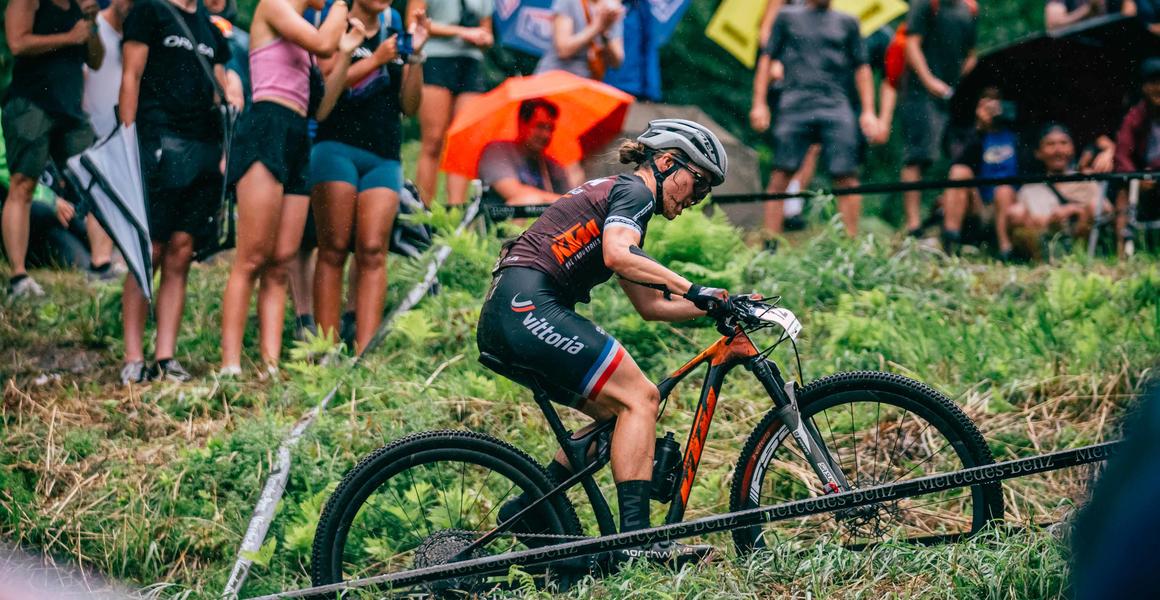Gender diversity: from offshore racing to mountain biking
01 December 2022

© Keno Derleyn -
Léna Gérault, 27, is a two-time mixed mountain bike relay World Champion in 2020 and 2021. A native of Briançon in eastern France, she is passionate about mountain biking and all outdoor sports. She believes that stereotypes in sport are there to be broken, and while there is still a lack of female athletes in her sport, things are changing for the better. We spoke to her about her experience competing in a mixed male/female format, and her vision for the future of sport.
Can you tell us about your mixed relay discipline?
There are several disciplines in mountain biking. There is Cross Country, which is the Olympic discipline: these are races of about 1-hour 30-minutes on a circuit of 3 to 4 km, with about 150 metres of elevation gain.
There is the XCC, which is shorter, about 20 minutes for a 1.5 km circuit with very little difference in altitude. Then there's the marathon, which is a big circuit of 60 to 100 km for the girls, with 2 to 3000 metres of elevation gain. In this discipline I am French champion. There is also downhill mountain biking and trials. The mixed relay is Cross Country. It is the discipline of the French, European and World Championships. We race in teams of 6 with several categories, one man and one woman per category. The junior category (17/18 years old), the U23 category (18 to 23 years old) and the Elite category, from 23 years old to the end of the pro career.
What does it mean to ride in a mixed team?
Riding in a team is definitely different. I enjoy it, I like to share, we join forces to achieve something. We need each other to progress together. It's different emotions and sensations.
Mixed gender brings different points of view and feelings. For example, boys may focus on how to jump an obstacle the furthest, while we're more interested in how to approach it technically. The girls may tend to analyse things more. We'll exchange together, it's enriching. They will sometimes push us to be more committed. I've already followed my teammates on paths I didn't necessarily feel like taking. I saw them doing it, they encouraged me by telling me that I was capable of it, so I followed them. Boys are not devalued by competing alongside girls. It's also up to both male and female team members to realise that they can contribute something.
Do stereotypes persist in mountain biking?
Yes, mountain biking is still a sport that seems masculine: you're in nature, you ride in all weathers, you get dirty... But we try to fight stereotypes because it's really not the reality. You can be completely feminine; you don't need to be ultra-muscular for example.
There is still a lack of female athletes, but it's changing, like in all sports. We have obtained the same race prizes as the men, which is absolutely not the case for road cycling. High-level sport is a reflection of society. In society, it's more acceptable for a little girl to dance than to ride a bike. As sportsmen and women, our positions are indirect. We have chosen to do this sport because we assume that we have not allowed ourselves to be influenced by the stereotypes of our society. It's a subject that concerns everyone, the brands, the sponsors, the race organisers...
What message would you like to send to girls who want to get involved in sports like mountain biking or offshore racing?
We have to believe in our dreams! Everything is possible even if you are a woman, you must not limit yourself, even if sometimes it can seem a bit harder than for a man. You have to believe in yourself and not be driven by others. I hope that one day a woman will win a major offshore race ahead of the men! That would be the best thing to encourage other women to come and feel legitimate to be there.


